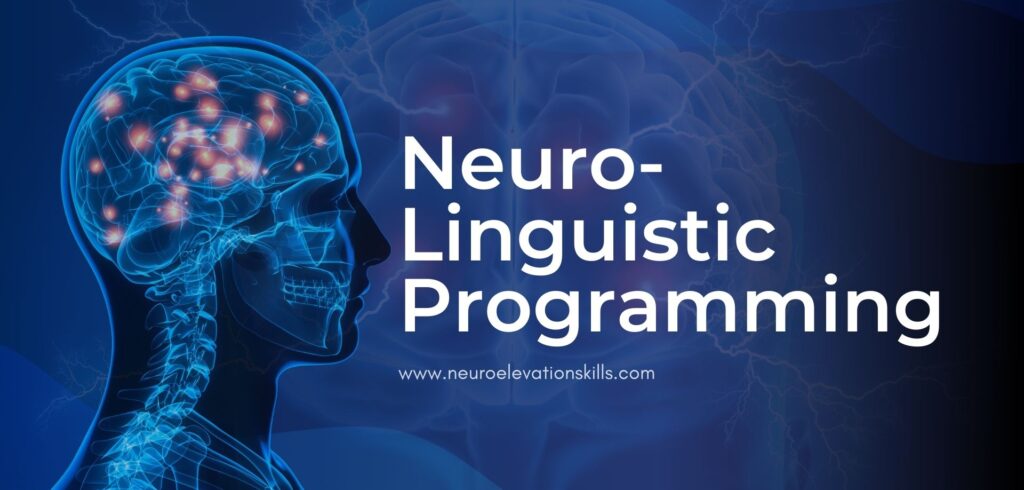Neuro-Linguistic Programming (NLP) stands out as a potent tool for personal and cognitive development. It was developed by Richard Bandler and John Grinder to understand the connections between neurological processes, language, and behavioural patterns. NLP delves into three key components: neuro, linguistic, and programming.
Neuro pertains to the brain and nervous system and the ways in which we organise our mental and emotional lives. It explores how our thought patterns, beliefs, and perceptions shape our experiences and behaviours. By understanding how the brain and body processes information and forms patterns, individuals can unlock the potential for profound self-awareness and growth.
Linguistic is not merely a means of communication; it’s a powerful vehicle that shapes our perceptions and experiences. NLP recognises the pivotal role of language in shaping our reality. By examining the language patterns we use, NLP practitioners can uncover deep-seated thought patterns and facilitate shifts in perspective.
Programming refers to the patterns of human behaviour—repetitive sequences of thoughts, emotions, and actions that become ingrained over time. NLP views these behavioural patterns as a result of underlying “programs” that can be understood, modified, and optimised for desired behavioural outcomes. Through techniques like modeling successful behaviours, and installing empowering anchors, NLP enables individuals to reprogram their minds for greater success.
The versatility of NLP is evident across various domains, from education and personal development to therapy and business. Whether you seek to overcome obstacles or achieve success, NLP offers a roadmap for unlocking your full potential.
Understanding NLP: A Brief Overview
NLP recognises that humans are inherently social beings, wired for connection from birth. Our neurology is finely attuned to interpersonal interactions, seeking validation, belonging, and understanding through communication and relationships. NLP harnesses these aspects of human nature as it explores the connection between neurology, language, and behaviour.
Central to NLP is the belief that unproductive patterns of thought, language, and behaviour can be identified and systematically reprogrammed. NLP practitioners employ various techniques to facilitate this process, aiming to promote a more constructive mindset and facilitate personal growth. These techniques include modeling successful behaviours, reframing negative thought patterns, and using specific language patterns to influence cognitive processes.
The principles of NLP suggest that by altering our internal and external communication, we can reshape our experiences and interactions. This transformative potential makes NLP a valuable tool for improving decision-making, which is inherently a cognitive and psychological process.

Understanding NLP in a Business Context
Decision-making is a complex process influenced by numerous factors, including emotions, biases, past experiences, and cognitive distortions. NLP offers a structured approach to navigate these factors effectively. By understanding the connections between the neurology, language and behaviour, professionals can enhance their decision-making prowess.
In the business world, decisions carry significant weight and outcomes can determine success or failure, understanding these interconnections is invaluable. NLP goes beyond personal development; it’s a strategic asset that can significantly impact organisational success. With NLP techniques, professionals can uncover the subconscious biases, cognitive shortcuts, and emotional triggers that influence their choices.
For example, you’re leading a critical negotiation with a potential client. The stakes are high, and the outcome will significantly impact your company’s future. Using techniques like mirroring and matching, you build rapport with the client, creating a foundation of trust and cooperation.
Another example is a scenario where you must make a critical decision during a financial crisis. Stress and anxiety threaten to cloud your judgment. Here, NLP’s anchoring technique becomes invaluable.
By associating a trigger such as clenching your fists with a state of calm and focus, you can quickly regain composure. This state management allows you to approach the crisis with a clear mind and weigh your options more rationally. In doing so, you can make decisions that minimises negative impacts on your business and employees.
Remember, every choice made by individuals in leadership positions has the potential to shape the trajectory of their careers, their organisations, and their relationships. For professionals, understanding and utilising NLP can lead to more effective decision-making, better team dynamics, and enhanced leadership skills.

NLP Techniques for Business Decision-Making
Managing Emotion and Stress
Stress and anxiety can cloud judgment and hinder decision-making. If you’re struggling to meet a tight deadline, NLP techniques can ease you into a state of calm and confidence. This emotional regulation ensures that decisions are made rationally and effectively, even under stress.
Understanding the Non-Verbals
NLP unveils hidden dynamics in non-verbal cues, from leaders’ confidence to salespeople’s persuasion and everyday influence. It helps us understand how subtle shifts in body language, tone, and facial expressions convey confidence and authority. By mastering the art of non-verbal communication, leaders create an atmosphere of connection and receptivity for successful negotiations and conversions.
Building Rapport and Trust
Successful business relationships are built on trust and rapport. NLP techniques such as mirroring and matching allow professionals to establish rapport quickly. It is through subtly mirroring the body language, speech patterns, and energy levels of their counterparts. By creating a sense of familiarity and connection, individuals facilitate smoother interactions and negotiations, leading to more collaborative decision-making processes.
Effective Communication
Clear and effective communication is essential for conveying ideas, gathering feedback, and resolving conflicts in the business world. NLP equips professionals with tools to enhance their communication skills, such as the Meta-Model. This technique help clarify vague or ambiguous statements, uncover underlying assumptions, and ensure that messages are conveyed accurately and comprehensively. Improved communication leads to mutual understanding and minimises misunderstandings, paving the way for more informed and productive decision-making.
Influencing and Persuasion
In business, the ability to influence and persuade others is often crucial for driving initiatives forward and gaining buy-in for decisions. NLP offers techniques to enhance persuasive communication, such as pacing and leading, embedded commands, and the use of sensory language. By subtly aligning with the perspectives of decision-makers and framing compelling messages, professionals increase their influence in shaping outcomes.
Conflict Resolution
NLP techniques focus on understanding and managing emotions to navigate conflicts and promote collaboration. Professionals can use the techniques like anchoring to anchor positive emotional states during challenging discussions or negotiations. Additionally, reframing techniques help in transforming conflicts into opportunities for growth and innovation.
Strategic Decision-Making
Strategic decision-making in business requires not only analytical rigor but also intuition and creativity. NLP techniques like future pacing enable professionals to gain multiple situational perspectives and anticipate the potential outcomes of their decisions. By considering the implications from different vantage points and visualising the desired future state, individuals can make more informed decisions.

Harnessing the Power of NLP for Business Success
NLP offers a wealth of techniques and insights that can significantly enhance decision-making processes in the business world. By mastering NLP techniques for building rapport, communicating effectively, and making strategic decisions, professionals can navigate corporate environments with finesse. Moreover, the application of NLP principles extends beyond the boardroom, enriching both professional and personal relationships.
Incorporating NLP into business practices isn’t just about improving financial outcomes; it’s about creating a culture of excellence and growth. By embracing NLP principles and techniques, businesses can cultivate a competitive edge and thrive in an ever-evolving market landscape. So, whether you’re a seasoned executive, an entrepreneur, or a team leader, consider integrating NLP into your decision-making toolkit to unlock your full potential of your professional journey.




